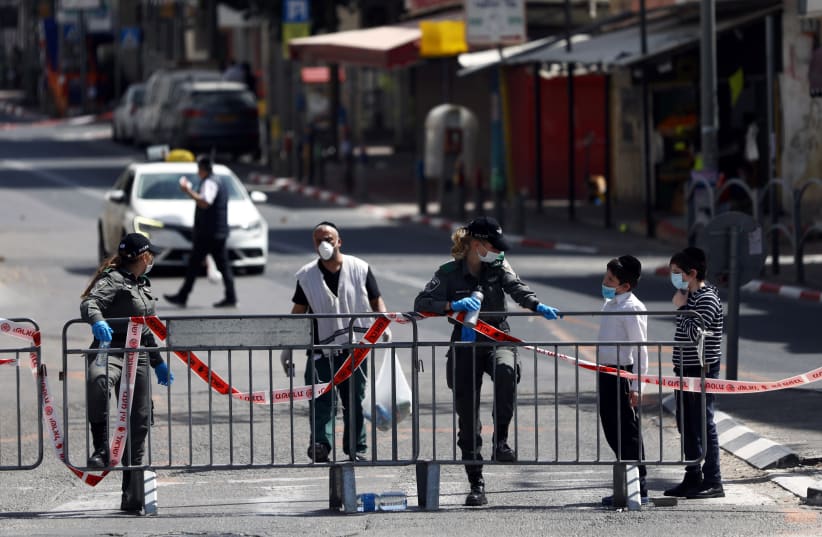Prime Minister Benjamin Netanyahu announced that the government would reimpose strict lockdown measures from Tuesday afternoon until Thursday morning, as Jewish families across Israel prepare to celebrate the end of Passover.The government unanimously approved reimposing the lockdown late on Monday night.
The clampdown on movement, mirroring those implemented ahead of Seder night last week, reflects fears that family gatherings during the festival and Mimouna celebrations could aggravate the coronavirus outbreak, as previously occurred during the Purim holiday.
"In the global fight against the coronavirus, there is no retreat," said Netanyahu in a televised address. "If we retreat before the right time, we are likely to pay a very heavy price in human lives. There are outbreak hotspots, which we are giving special treatment and our attention is focused on retirement homes."
From 5 p.m. on Tuesday until 5 a.m. on Thursday, Israelis will not be permitted to leave their towns and cities. In Jerusalem, movement will be restricted within pre-defined neighborhoods.
To prevent crowding following the conclusion of Passover on Wednesday evening, bakeries and supermarket bread departments will not reopen until Thursday morning.
Promising to emerge strongly from the economic crisis caused by the outbreak, Netanyahu said the government will make a "final decision ahead of the weekend" regarding gradual restoration of the economy and the reopening of the education system.
The country's death toll climbed to 119 on Tuesday afternoon with the death of an 82-year old man at Wolfson Medical Center in Holon, preceded earlier by the passing of an 81-year-old man Ichilov Hospital. A total of 11,868 people cases of the coronavirus have been confirmed to date, including 180 patients in serious condition, and 136 requiring ventilation. Some 2,000 individuals have recovered from the virus.
A total of 7,680 tests were carried out between Sunday and Monday morning, the Health Ministry said, up from less than 6,000 a few days before. The ministry said it is targeting 10,000 daily tests during the Passover holiday.
The key coronavirus battlegrounds nationwide continue to be Jerusalem and Bnei Brak, with a total of 2,093 and 1,888 cases respectively.
Fueling fears regarding the continued spread of the virus within haredi neighborhoods, the worst-hit locations on a per capita basis are Bnei Brak (967 cases per 100,000 people), Kiryat Ye'arim (683), Kfar Chabad (654) and Kochav Ya'acov (651).
Deputy Attorney-General Raz Nizri informed the Association for Civil Rights in Israel on Monday night that the emergency restrictions on individuals leaving their homes do not apply to approved-protests.
Nizri explained that if someone is attending a police-approved protest, restrictions regarding gatherings of large crowds and remaining close to one's residence do not apply.
Following a campaign largely fought in the media, all residents and staff at the Mishan senior living center in Beersheba will be tested for the coronavirus., Israeli media reported.
Thirteen residents of the retirement home have died from the virus to date, placing the facility at the center of a national debate on insufficient testing of the elderly and other at-risk citizens.
Amid speculation regarding the possible return of children to school following the Passover break, scheduled to finish on April 19, Education Ministry Director-General Shmuel Abuav said there is no "currently no decision" to return to in-class learning.
"Ninety-seven per cent of the world's children are at home, and not in class," Abuav told Army Radio. "No countries have decided to return to full-time learning."
Abuav said he expects to reach an agreement with the Teachers Union of Israel and return to online remote learning after the Passover break.
The summer vacation will need to be shortened to catch up with missed content, he added, without committing to a particular schedule.
